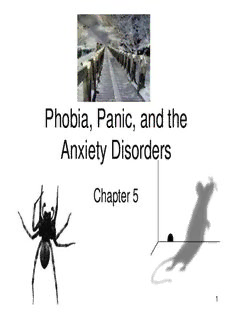
Phobia, Panic, and the Anxiety Disorders - Anderson University, a PDF
Preview Phobia, Panic, and the Anxiety Disorders - Anderson University, a
Phobia, Panic, and the Anxiety Disorders Chapter 5 1 2 The Nature Of Anxiety Disorders • False alarms in response to harmless stimuli • Inordinately apprehensive, tense, uneasy • Interferes with functioning • May be disabling • Physical and psychological reactions • Cognitive and affective components • Twelve percent of Americans affected 3 The Nature of Anxiety Disorders • Fear is an innate alarm response to a dangerous or life-threatening situation. • Anxiety is the state in which an individual is inordinately apprehensive, tense, and uneasy about the prospect of something terrible happening. • People with anxiety disorders are incapacitated with chronic and intense feelings of anxiety. 4 Discriminate between the Disorders • Phobia is a fear of a specific object • PTSD numbing fear after experiencing a specific trauma • Panic anxiety that occurs suddenly • Agoraphobia fear of a panic attack in a public place • GAD pervasive anxiety that is nonspecific, experiential an chronic 5 Anxiety Fear Specific vs. General Object vs. Experience Sudden vs. Chronic Generalized Panic Phobia PTSD Anxiety Disorder Disorder Agora phobia 6 Four Elements of Fear • Cognitive - thoughts of impending harm, exaggerating the actual amount of danger; • Somatic - paleness of skin, goose bumps, muscle tension, face of fear, heart rate increase, accelerated respiration; • Emotional/subjective - feelings of dread, fear, or panic, queasiness or "butterflies"; and • Behavioral - decreasing appetite, escape, avoidance, freezing, aggression. 7 1. In which of the four areas do you most intensely feel anxiety? 8 Fear vs. Anxiety • Anxiety has the same four components as fear, • The cognitive component differs – fear is the expectation of a clear and specific danger, – anxiety is the expectation of something of a much more diffuse danger; Ex. "Something terrible might happen," • Treatments will be the same except in cognitive area 9 http://www.healpastlives.com/future/cure/crpanic.htm Panic Disorder 10
Description: